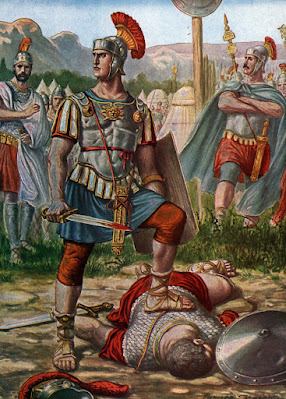T. Mānlius Torquātus cōnsul exercitum Rōmānum ad disciplīnam
sevērissimam īnstituit. ‘Nēmō’ (sīc mīlitibus ēdīxerat) ‘sōlus extrā ōrdinēs
cum hostibus pugnābit.’ Praeerat tum hostium equitibus vir propter virtūtem
nōtissimus Geminus Mettius: Mānliī fīlium Mettius ad certāmen prōvocāvit. Mōvit
iuvenis animum intrepidum vel īra vel pudor: patris iussa neglēxit hostemque
superāvit et occīdit. Tum corpus Mettīī spoliāvit, spolia magnō cum gaudiō ad
patrem portāvit. Pater autem ‘Quoniam, T. Mānlī,’ inquit, ‘nec cōnsulis
imperium nec patris auctōritātem timēs contrāque imperātōris iussa extrā
ōrdinēs sōlus hodiē cum hoste pugnāvistī mīlitāremque disciplīnam neglēxistī,
poenās audāciae morte persolvēs. Trīste exemplum erimus, sed reliquīs iuvenibus
ūtile.’ Statim patris iussū fīlius ad supplicium dūcitur.
[1] Lines 1 – 2 (T. Mānlius … pugnābit)
[i] How did Manlius Torquatus treat the
Roman army? (1)
[ii] What order was given to the
soldiers? (2)
[2] Lines 3 – 6; translate into English (15)*:
Praeerat tum hostium equitibus vir
propter virtūtem nōtissimus Geminus Mettius: Mānliī fīlium Mettius ad certāmen
prōvocāvit. Mōvit iuvenis animum intrepidum vel īra vel pudor: patris iussa
neglēxit hostemque superāvit et occīdit. Tum corpus Mettiī spoliāvit, spolia
magnō cum gaudiō ad patrem portāvit.
[3] lines 6 – end (Pater, autem … dūcitur)
In your own words explain – with
reference to the extract – the Roman attitude towards military discipline (12)**
https://en.wikipedia.org/wiki/Titus_Manlius_Imperiosus_Torquatus
Manlius's son disobeys orders and
fights a duel with a Latin warrior. Early 20th century book illustration
Titus Manlius Torquatus (Goltzius: c.
1590)
Consul Titus Manlius Imperiosus
Torquatus defeating a Gallic in 361 BC (Illustration by Tancredi Scarpelli)
____________________
* [2] [i] At that time Geminus Mettius,
¦ [ii] a man very well-known ¦ [iii] on account of his courage, ¦ [i] was in
command ¦ [iv] of the cavalry: ¦ [v] Mettius challenged Manlius’s son ¦ [vi] to
a contest / battle. ¦ [vii] Either anger or shame ¦ [viii] stirred the mind ¦
[ix] of the fearless young man; ¦ [x] he ignored / disregarded his father’s
commands, ¦ [xi] and conquered ¦ [xii] and killed [xi] the enemy. ¦ [xiii] He
then despoiled (robbed) the body of Mettius ¦ [xiv] and, with great joy,
¦ [xv] carried the spoils to his father.
** [3] A military command is absolute;
on no account should it be disobeyed. By acting alone and fighting outside the
ranks the son disobeys the superior authority of Manlius as consul, commander
and father:
… T. Mānlī,’ inquit, ‘nec cōnsulis
imperium nec patris auctōritātem timēs contrāque imperātōris iussa extrā ōrdinēs
sōlus hodiē cum hoste pugnāvistī …
Manlius’s reference to his son showing
no fear (nec patris auctōritātem timēs) may suggest that
the latter thought there would be no repercussions since the command had been
given by his father. However, military hierarchy is unassailable and superior
to family bonds. Consequently, Manlius shows no favoritism towards his son. Despite
the son’s killing of Mettius that victory does not justify the disregard of
military discipline:
mīlitāremque disciplīnam neglēxistī
The son’s failure to adhere to command
is so intolerable that even his own father condemns him to death:
poenās audāciae morte persolvēs
The reference to audācia serves
as a warning; here the noun has its full negative sense of “recklessness”.
Manlius’s son, provoked by an enemy soldier, fails to maintain self-control and
for that he must pay the ultimate price. The father must show to other young
soldiers that he will always be consistent in upholding military discipline
irrespective of the offender and irrespective of the personal distress his
decision will cause:
trīste exemplum erimus, sed reliquīs
iuvenibus ūtile
The father is so secure in his own
judgement that there is no time for reflection or appeal, the son led straightaway
to his punishment in the concisely and dramatically expressed conclusion, the
use of the historic present tense (dūcitur) adding to the sense of
immediacy:
statim patris iussū fīlius ad
supplicium dūcitur





No comments:
Post a Comment